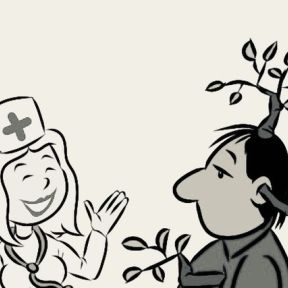
Regression
Regression is a defense mechanism in which people seem to return to an earlier developmental stage. This tends to occur around periods of stress—for example, an overwhelmed child may revert to bedwetting or thumb-sucking. Regression may arise from a desire to reduce anxiety and feel psychologically safe.
Defense mechanisms are unconscious strategies that people use to protect themselves from anxious thoughts or feelings. The concept originates from the work of Sigmund Freud and was developed in large part by his daughter Anna. Although many of Freud’s ideas have been disproven over time, the notion of defense mechanisms has endured. Psychologists today still believe that internal conflict can manifest in specific patterns and dynamics like regression.

Regression is behavioral "backtracking" or reversion to earlier coping mechanisms that can occur as people progress through different stages of development. Stressful situations may lead to internal tension, sending people back to a time of familiarity and security. For example, a person with a serious physical illness might cry in the fetal position even though that's not how they typically respond or behave. Understanding triggers can be helpful to observe in a therapeutic context; they can signal challenges that need to be addressed.
Freud's theory of psychosexual development holds that people develop through stages such as the oral, anal, and phallic stage, so that by the time they're five or six, the basic structures of personality are set. However, people can sometimes revert back to a previous stage of development instead of addressing their challenges in an adaptive way, particularly under stress. In Freudian parlance, this could lead to “neurosis."
Taking time to spot regressive behavior and understand what triggered it can be helpful in therapy. Triggers of regression, which a therapist might identify, represent underlying sources of stress. Talking about that stress can help people process it, develop coping skills, and change their behavior moving forward.
Regressive behavior doesn’t always signal that something is wrong; natural fluctuations can take place during development. In some cases, however, regression can be a symptom of childhood abuse or trauma, along with symptoms such as irritability, difficulty concentrating, increased vigilance, trouble sleeping, and regular stomachs and headaches, among others. Therapy can help children process the experiences they’ve endured to restore daily functioning, emotional well-being, and trusting relationships.

Operating below one’s typical level of functioning doesn’t just occur in the therapist’s office. Regression can occur in daily life as well, from moments of immaturity in romantic relationships to more substantial developmental challenges in childhood.
Regression often emerges under stress. For example, a driver stuck in traffic may get angry and throw a tantrum, even though he doesn’t usually behave that way. Or a child may revert to sucking their thumb or wetting the bed after a trauma. As a defense mechanism, regression represents a return to a previous stage that felt more secure.
When emotionally overwhelmed, people may revert to childhood strategies to have their needs met. In these moments, that “inner child” can wreak havoc on relationships. People might throw tantrums when they don’t get their way instead of communicating calmly or letting it go, manipulate their partner to get what they want instead of asking directly or doing without, rebel instead of discussing difficulties, and avoid conflict instead of voicing their own needs.
The seismic shift of the pandemic introduced many new challenges. Just like adults, kids have sometimes had trouble adjusting a new normal. This can result in regression to less mature levels of functioning. Children may become frustrated more easily, become more clingy, have more bathroom accidents, experience sleep disruptions, and change their eating patterns. For example, a child who previously transitioned to school easily may begin to feel anxious when needing to separate from a parent.
If a child is regressing, parents should avoid shaming the child for her behavior or bribing, cajoling, or punishing her to act in age-appropriate ways. Instead, acknowledge that she’s having a hard time and validate her emotions. Listen to her experience, and then brainstorm ideas to address underlying sources of stress. Adapt routines as needed, for example around bedtime or potty-training, and then stick to the boundaries you establish.


![By Max Halberstadt [ Christie's] Public Domain](https://cdn2.psychologytoday.com/assets/styles/manual_crop_3_2_600x400/public/field_blog_entry_teaser_image/2018-05/sigmund_freud_by_max_halberstadt_cropped.jpg?itok=ubxSjnfb)










